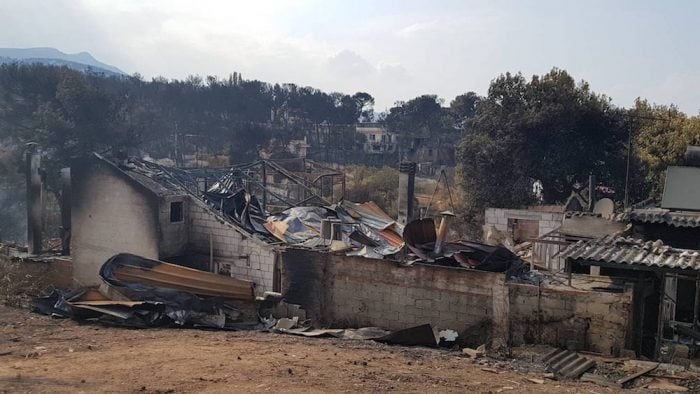The flames of Mati still burn bright in the collective memory of Greece. Six years have passed since the devastating fires of July 23, 2018, that stole lives and etched horrifying images onto the hearts of the nation.
As memories of the Mati fires are reignited by media coverage and social media posts from grieving families, a persistent question remains unanswered: what went wrong?
The ruthless flames left 104 people dead, and some 250 injured, while approximately 2,500 houses were either burned to the ground or damaged.
The youngest victim was 6 months and the oldest was 93 years old. The flames destroyed one of the most beautiful and verdant seaside spots in Attica in less than twelve hours.
Commemorative events for the 6th anniversary of the tragedy took place in the morning, when a memorial service was held, in the church of Aghios Ioannis, in Neos Voutzas.
At 18:30, at the Memorial of the Victims, in Neos Voutzas, a liturgy will be held followed by the Invocation of the 104 dead. A march will follow and the main ceremony at the Naval Sports Club in Mati (N.A.O.M.A.), at 20:00.
On the Argyra Akti, between the municipalities Marathonas and Rafina-Pikermiou, where many victims were trapped trying to escape the flames, 104 floating lanterns will be left in the sea: “to travel in memory of the people who drowned, in memory of the people who waited in the water with their flesh burning for help that came too late, the people who died in the water, the people who never reached the water, the people who were trapped and had no water.”

Mati fire was the globe’s second-deadliest wildfire this century
The fire at Mati is the second-deadliest wildfire of the century after the 2009 bushfires in Australia which killed 173 people. It is also counted as the sixth-deadliest in the last 100 years.
The flames were so intense that they trapped and burned people inside their houses, cars, or a few meters away from the beach. Thousands of vehicles and houses were destroyed before the fire was brought under control hours later. An entire summer camp composed of 620 children was evacuated in an overnight operation. Many animals (wild and domestic) died or were injured due to the fire.
Greek Prime Minister Alexis Tsipras declared a state of emergency in Attica, and announced a three-day period of national mourning, stating in a televised address, “The country is going through an unspeakable tragedy.”
Grief in Greece replaced by anger
After the fires, flags atop the Acropolis and the Greek Parliament flew at half mast. The European flags at the European Commission headquarters in Brussels also flew at half mast in honor of the victims. Many countries worldwide helped or offered aid to Greece.
Many believe that most of the lives lost could have been saved. Had the authorities acted efficiently and competently, most of the people who met a horrible death that day might be with their loved ones today.
Thus, the grief was soon replaced by anger. Anger toward the police and fire service who were slow to respond and evacuate. Anger toward the political authorities who went to the operation center late at night and pretended that there were no casualties.
But there was even more anger when the government switched the blame to the houses that had been built without a permit, blocking the escape routes. Or when no official even had the humanity to offer an apology, or express the slightest amount of grief over the catastrophe.
Defendants to stand re-trial six years later
Twenty defendants in the case over the deadly 2018 fire in Mati, East Attica, will stand trial anew, as if they were never acquitted or convicted, after a decision by the Athens Appeals Prosecutor’s Office in May 2024.
Following a review by Appeals Prosecutor Spyridon Papas, the controversial verdict in late April convicting only five of the 20 defendants – former officials with responsibility for rescuing citizens and extinguishing the fire – was deemed incorrect and therefore an appeal was filed for all the decisions.
These include the acquittals, the mitigating factors recognized by the court for the five convicted – four high-ranking officials of the Fire Service and one of the Operations Coordination Center – as well as the penalties imposed and their conversion into fines.
The conviction of Konstantinos Angelopoulos, who started the fire through criminal negligence, is not included in the appeal.



